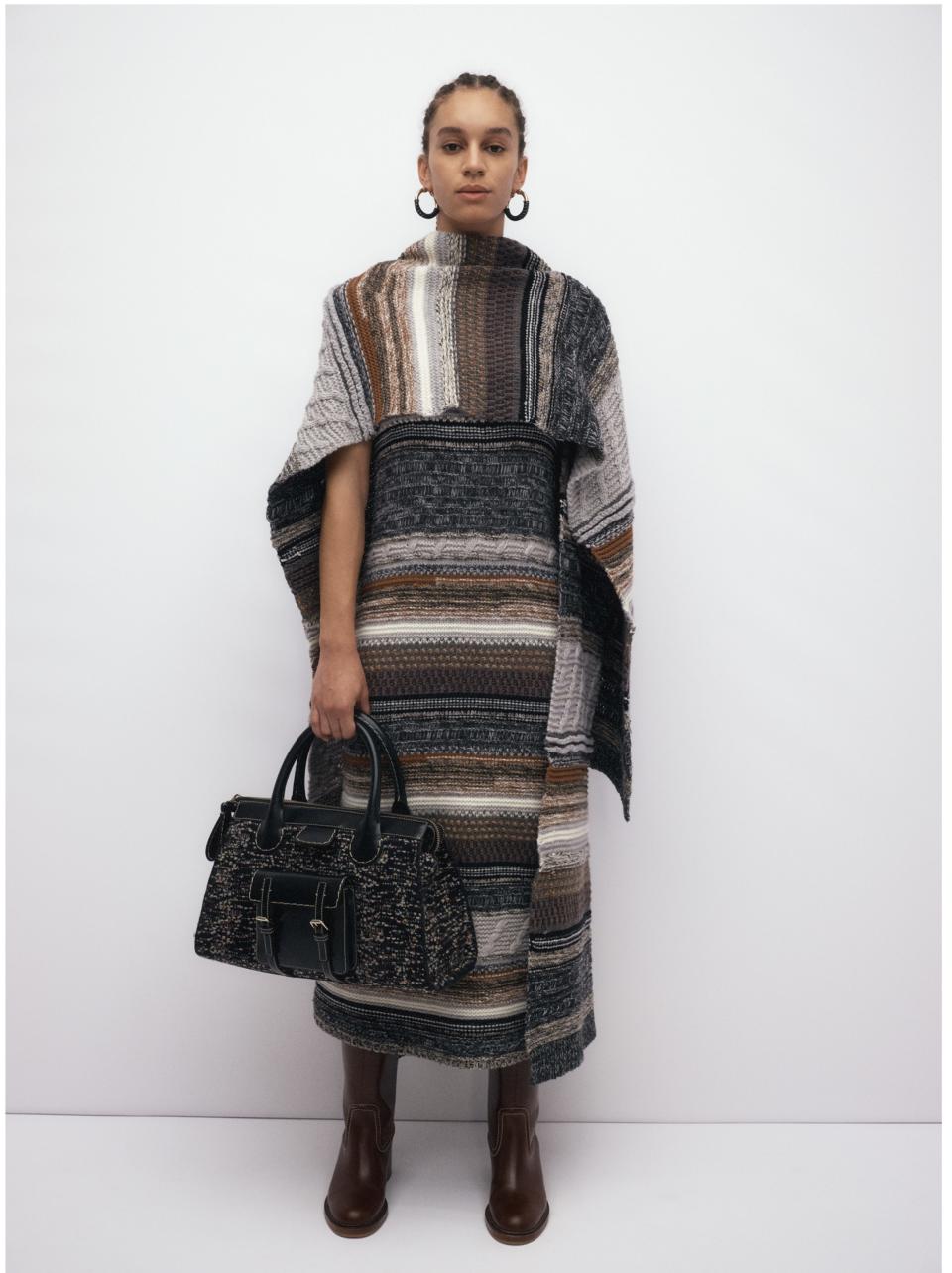CEO Talks: Chloé’s Riccardo Bellini Details Eco, Social Progress

When Chloé attained B Corp status last October, it was a major milestone for the fashion house in terms of its environmental ambitions, yet only one stepping stone on its long path to fully becoming a company that is purpose-driven, community-based and accountable.
What was perhaps most gratifying to chief executive officer Riccardo Bellini, the architect of the new business model, was that the designation immediately prompted calls from several luxury peers inquiring about ways to make their companies more environmentally and socially sustainable.
More from WWD
“I think industry collaboration is becoming an essential part of any climate strategy. You cannot handle this issue alone,” he said.
In his view, the COP26 climate summit in Glasgow, Scotland, last November unleashed “a sense of urgency to change, to collaborate and to find solutions.”
Part of the commitment of B Corp members is to promote the label, and Bellini is an articulate and enthusiastic, yet grounded, champion of companies doing good for the planet and people, while still pursuing profits.
He declined to say which brands reached out to him with requests for advice and information, stressing that “each company has to pursue their own journey and evaluate if B Corp is right for them or not.”
Still, the designation is fueling “exceptional conversations,” reflecting a “genuine interest” in new business models that are more sustainable.
“B Corp is rooted in collaborating together toward a better way of doing business,” he said. “It’s our role to spread the gospel, to walk the talk, and to support like-minded companies that want to follow a similar path.”
In an exclusive interview roughly one year after he disclosed Chloé’s new business approach, Bellini reviewed progress after an eventful 2021 for the French brand, part of Swiss luxury group Compagnie Financière Richemont.
“The principle behind the purpose-driven model is the shift from a shareholder mentality to a larger stakeholder mentality,” he explained, characterizing it as a “foundational and long-term cultural shift for this company.”
With it comes a new set of measuring sticks, framed by a “triple bottom line” — for environmental, social and financial progress.
Bellini exalted the B Corp status for offering “an accountability toolbox” as a management tool, enabling Chloé’s leadership team to start developing a precise action plan based on its scoring and to set targets across the company.
Its new sustainability board, which is responsible for holding the company accountable, met twice last year, most recently in October to review progress to date.
As of late last year, the company was on track to meet 2021 goals of:
Making sure at least 50 percent of materials used for ready-to-wear collections are lower-impact, a goal overachieved for the pre-fall 2022 collection, reaching 70 percent.
Reducing global carbon emissions per product by 15 percent.
Producing at least 20 percent of ready-to-wear in collaboration with fair-trade organizations and social enterprises such as Akanjo or Made 51.
Positively impacting at least 30,000 girls via its UNICEF Girls Forward partnership.
Launching an internal volunteering program offering up to eight hours a year, per employee.
“We’re extremely transparent,” Bellini said, noting that all of its 2021 and three-year goals are published on the company’s website, under the sustainability sections. Its ESG activities are also well documented on its LinkedIn page.

Courtesy of Chloé
Last July, Chloé published its first environment profit and loss account, covering 2020, which details everything from its greenhouse gas emissions by category of product to water consumption, air pollution, waste and land use.
It is now planning to publish a social profit and loss account, considered an industry first, by the end of 2023, having conscripted a research team at the Institut Français de la Mode, and with the support of the Conservatoire National des Arts et Métiers. The methodology has been approved and first tests will be conducted this year, in tandem with industry consultations.
Bellini noted that Chloé will open-source the methodology for anyone in the industry who wishes to measure its social impact on different factors, such as gender equality and inclusion.
There are also intangibles, including Chloé’s newfound attractiveness as a workplace for Millennials, who meticulously research companies’ values and environmental track records, and a higher level of engagement among current employees, according to the executive.
“This is bringing completely new energy and a new sense of inspiration,” Bellini enthused.
Addressing other aspects of the business, Bellini gave a shoutout to its creative director Gabriela Hearst, who unveiled her first collection for the brand last March.
“We have been going through a major creative rebound over the past year, and Gabriela has been a key force behind all this process of transformation creatively and also on the sustainability agenda,” he said. “Over the last few seasons we have been streamlining and sharpening in a very clear way our creative message.”
Without mentioning specific talents, he said “we have been renewing our creative teams across all product categories.”
Richemont does not break down results by brand, but has cited improvements in its “other” businesses, which include its fashion and leather goods maisons, in the six months ended Sept. 30, with sales rising 3 percent at constant currency.
In the interview, Bellini said, “we have been seeing a very positive dynamic and very promising initial response” to the creative renewal from existing clients, past clients and “a flow of new clients coming into the brand.”
“Of course, this is just the beginning of the long journey and a long transformation that we are approaching with a very long-term view,” he said. “I’m a big believer in balance, and I refer to balance in our category mix of ready-to-wear, shoes and bags; balance in our geographical footprint, and balance in our channel mix.”
In tandem with the arrival of Hearst’s first Chloé products, the brand swept clean its Instagram account, and confounded many of its 9.8 million followers with close-up images of insects, mushrooms, flowers and the occasional female body part. Eventually it posted more images of actual products, like its new low-impact Nama sneaker.

Courtesy
“It generated a very powerful and interesting and animated conversation,” he said of the new communication approach. “In today’s world, fashion companies need to start reflecting in a larger way the role of communication” beyond just creating desire for products.
“We need to recognize that our communication can also have a positive and powerful impact culturally… It can also trigger a positive narrative and the positive impact to the outside world,” he asserted.
Over the last two years Chloé has been “re-balancing” its channel mix from wholesale toward direct-to-consumer sales, which now account for about 60 percent of business. The brand counts 125 directly operated boutiques.
Bellini described “gradual” growth of the brand’s retail network, with his primary focus on “consolidating and upgrading.” The company has quietly debuted a range of “pop-ins” — a refreshed design concept already present in boutiques including Paris, New York, Shanghai, Taiwan, Beijing and Tokyo. A new store concept is to be rolled out a later stage.
A temporary space serving coffee and chocolates by Alain Ducasse at the Saint-Honoré flagship in Paris last October was among initiatives to bring new energy into the stores.
Chloé has also made significant progress on the digital front, with digital penetration increasing to 25 percent, up from 10 percent two years ago.
“We transformed all our platforms in China and established a new omnichannel technology platform for our China business. And now, we are excited for the partnership with Farfetch,” he said, referring to Richemont’s quest to create a neutral, industry-wide platform, built on the latest omnichannel retail technologies.
He flagged “significant work” ahead on its social and environmental footprint, and its supply chain, along with an ongoing cultural shift within the company.
Not that Chloé is going it alone. The executive touted collaborations with the Ellen MacArthur Foundation, the Fashion Pact and the Prince of Wales’ Sustainable Markets Initiative.
“I think there is a shift in mentality in collaborating more and more with other players to drive change,” he said.
Chloé will mark its 70th anniversary in 2022 with a variety of events and initiatives to promote the heritage of the brand and exalt the innovative values and ideas that founder Gaby Aghion brought to the industry, first and foremost using fashion to support the advancement of women in society.
“Those values are exceptionally current in many, many ways now and they’ve been a key source of inspirations for our purpose work,” he said.
SEE ALSO:
Gabriela Hearst and Chloé Go Way Back
Chloé Attains B Corp Certification
Chloé Quietly Shifts to Purpose-Driven Business Model
Sign up for WWD's Newsletter. For the latest news, follow us on Twitter, Facebook, and Instagram.

